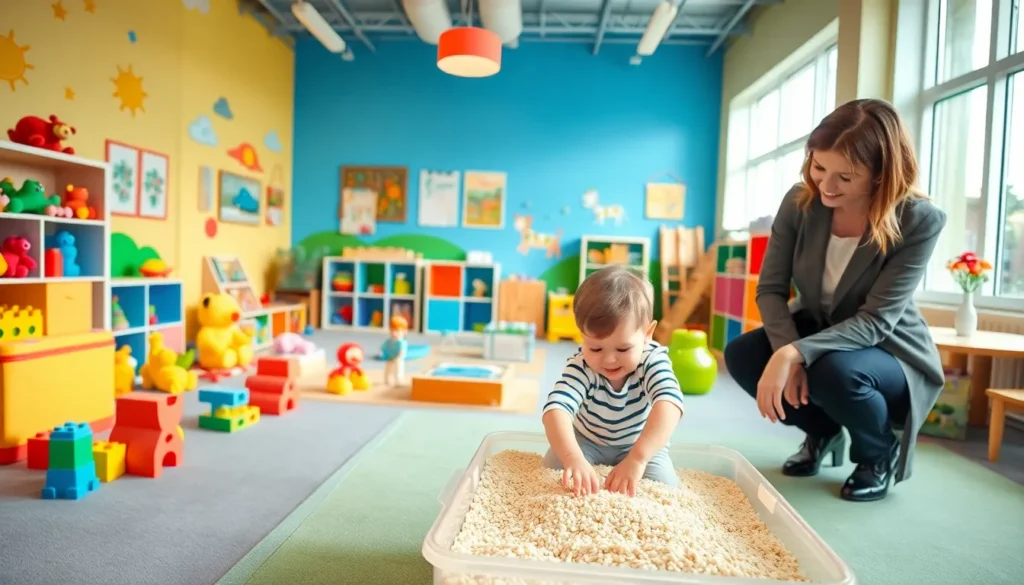When relationships crumble, it can feel like the world is ending, especially for children caught in the middle. Enter co-parenting therapy: a guiding light in what can be a stormy emotional sea. Picture this: two parents who once shared dreams and aspirations now navigating the complex waters of shared child-rearing. It sounds daunting, but with the right tools and professional guidance, they can transform from adversaries to effective co-parents. Let’s explore how co-parenting therapy can heal wounds and build bridges, paving the way for healthier family dynamics.
Table of Contents
ToggleUnderstanding Co-Parenting Therapy

Co-parenting therapy is a specialized practice designed to assist parents in managing their shared responsibilities after a separation or divorce. Unlike traditional therapy, which might involve individual counseling, co-parenting therapy focuses on fostering communication and cooperation between both parents. This approach acknowledges the emotional strains that come with separation while prioritizing the well-being of the children involved.
One might wonder: how does it work? Through structured sessions, therapists help parents address conflicts, set boundaries, and establish mutual goals for their children. The overarching aim is simple yet vital: to ensure that children thrive even though the changes in their family structure.
Benefits of Co-Parenting Therapy
The advantages of participating in co-parenting therapy are numerous and impactful. First and foremost, effective communication channels are established, allowing both parents to express their thoughts and feelings without misinterpretation. This development alone can mitigate unnecessary conflicts, creating a smoother parenting experience.
Also, co-parenting therapy equips parents with conflict-resolution skills. Instead of letting disagreements escalate, they learn techniques to navigate issues constructively. And let’s not forget the children, research shows that children from cooperative co-parenting arrangements tend to perform better emotionally and academically. By investing in therapy, parents make a proactive choice to prioritize their children’s well-being above all else.
Common Challenges Addressed in Co-Parenting Therapy
Even the most well-intentioned parents face challenges in a co-parenting scenario. Co-parenting therapy tackles these head-on. One common issue is differing parenting styles, which can create tension. For instance, one parent may favor strict discipline, while the other advocates for a more relaxed approach. This disconnect can lead to confusion for children who feel torn between their parents.
Another challenge often addressed is the impact of new relationships. A parent’s new partner can complicate the dynamics, leading to feelings of jealousy or insecurity. Through therapy, parents can explore these emotional hurdles, enabling them to develop shared strategies for introducing new partners respectfully and gradually.
The Co-Parenting Therapy Process
The co-parenting therapy process typically begins with an initial assessment to understand the specific challenges faced by both parents. During the first few sessions, the therapist gathers important information about the family dynamics, communication patterns, and co-parenting arrangements. This insight helps tailor the subsequent sessions to address the unique aspects of each family.
Therapists often employ techniques such as role-playing and guided discussions to help parents practice new communication strategies in real-time. As therapy progresses, the focus shifts toward creating action plans for future co-parenting situations. Parents leave each session with concrete tools to enhance their collaboration.
Tips for Choosing the Right Co-Parenting Therapist
Finding the right therapist can feel like searching for a needle in a haystack. Here are key tips to simplify the process. Start by seeking referrals from trusted sources, whether it’s friends or online parenting forums. Look for therapists who specialize in family dynamics and have solid credentials.
Next, consider the therapist’s communication style. It’s crucial to find someone with whom both parents feel comfortable. Many therapists offer introductory sessions: seize this opportunity to gauge compatibility. Finally, check reviews and testimonials. Previous clients’ experiences can provide valuable insight into the therapist’s effectiveness.
Success Stories: Real-Life Impact of Co-Parenting Therapy
The transformative effects of co-parenting therapy can often be best understood through real-life success stories. Take, for instance, a couple whose constant bickering disrupted their children’s peace. After just a few months of therapy, they learned to address conflicts calmly and collaboratively. No longer were holidays a source of tension: instead, they became opportunities for unified family celebrations.
Another case involved a parent struggling with feelings of inadequacy due to a partner’s presence in the children’s lives. Co-parenting therapy equipped them with tools to communicate openly about their fears. As a result, not only did their relationship with the co-parent improve, but the children flourished in an environment filled with support.




